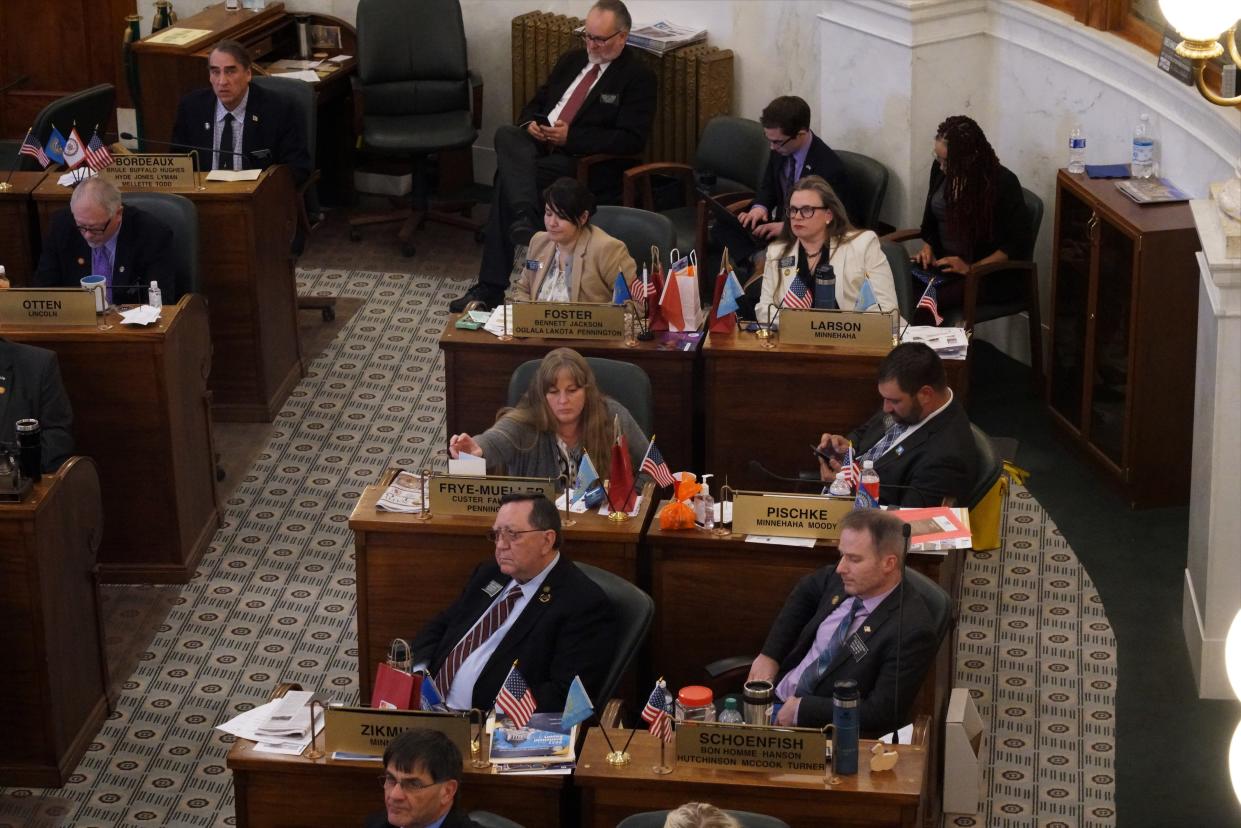Attempt to block COVID vaccines from required school immunizations fails in committee

A bill aimed at preventing COVID-19 vaccines from becoming mandatory for children attending public schools in South Dakota failed to pass the state’s Senate Health and Human Services Committee on Wednesday.
Sen. Julie Frye-Mueller, R-Rapid City – who was recently censured by the state Senate after she allegedly made harassing comments about vaccinating children to a legislative staffer – introduced the bill. It says no official “may impose on a child any additional vaccination or immunization requirements” beyond the existing list of required vaccines: “poliomyelitis, diphtheria, pertussis, rubeola, rubella, mumps, tetanus, meningitis, and varicella.”
Opponents said the bill would also strip the Department of Health of any authority to administer and modify the state’s public school immunization requirements in the future.
“We don’t know what the future holds,” said Deb Fischer-Clemens, a lobbyist for Avera Health, in opposition to the bill.
Proponent testimony included members of the public who said they have done their own research about vaccines – like Heather DeVries of Madison, who thinks no new vaccines should be mandated. She said the internet has enough information to ensure parents make the right choice about immunizations.
“We have the ability to research them because we have the internet,” DeVries said. “We have a voice to say ‘yes’ or ‘no,’ it’s our choice.”
The bill also gained support from some out-of-state doctors who argued parents should have the right to choose whether or not their children receive the COVID-19 vaccine. Dr. John Littell, of Florida, alleged that medical boards around the U.S. have become corrupted by federal agencies, and childhood vaccines are not useful in rural states.
“Most if not all childhood vaccines were developed with the intent of putting out the fire in children that are high-risk,” Littell said. “Children in inner-city populations who were not being breastfed, who were in daycares.”
Opponents: COVID vaccine is safe
Opponents, including the South Dakota State Medical Association, said the research on COVID-19 vaccines is clear.
“The COVID-19 vaccine has been repeatedly found by almost every peer-reviewed journal and the CDC as being safe and effective for kids,” said Justin Bell, a lobbyist for the association.
The state Department of Health has the authority to administer the state’s immunization requirements and add or remove vaccines from the list.
“If you pass this bill, all of this goes away,” Bell said. “You are, essentially, taking away all of the rules as it relates to the current immunization schedules that we have.”
Additionally, Bell said proponents cited no evidence that the Department of Health is planning to add COVID-19 vaccines to the list of required immunizations.
The Department of Health did not testify, nor was a representative available to take questions during the bill’s hearing.
Sen. Sydney Davis, R-Burbank, made the motion to kill the bill. She said the Department of Health has come to the Legislature in the past to modify the list of immunizations.
“In 2016, meningitis, we were here, adding it to the statute,” Davis said. “I think it’s obvious that our Department of Health is working in good faith with the Legislature to make any additions to this.”
Another Frye-Mueller bill
That wasn’t Sen. Julie Frye-Mueller’s only bill that failed in the committee on Wednesday.
Frye-Mueller also introduced a bill that would require doctors, including dentists, to assess and inform patients prior to prescribing an opioid for pain management. The assessment would include a physical examination, an assessment for substance abuse issues, and a brief on the dangers of the drug.
The bill would have also limited opioid prescriptions to three, four and seven-day allotments, depending on the age and circumstance of the patient. If the patient were to require more than 30 days on the drug, the bill would require doctors to inform the patient of the dangers, investigate alternative methods of care, and have the patient sign an agreement stating they would only seek refills from that doctor.
Doctors would also be subject to a lawsuit for not following the language in the bill.
“Why can’t a little extra time be taken in the doctor’s office when a life is at stake?” Frye-Meuller said.
Opponents included Sanford Health and Avera Health, and the South Dakota Pharmacists and State Medical associations.
Opponents took issue with, among other text in the bill, a part that says, “a person receiving treatment for substance abuse, including opiate or opioid abuse” is excused from the rules in the legislation.
“This would seem to allow someone who is suffering from addiction issues, from these substances, to be able to bypass any of the protections set forward in this bill,” said Mitch Rave, a lobbyist with Sanford Health.
Four of Frye-Mueller’s eight bills introduced during this year’s 38-day legislative session at the Capitol in Pierre have failed so far. Three have yet to be heard by a committee. The eighth bill was withdrawn at her request.
This article originally appeared on Sioux Falls Argus Leader: Attempt to block COVID vaccines from required school immunizations fails in committee

